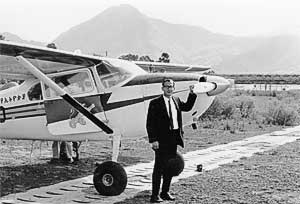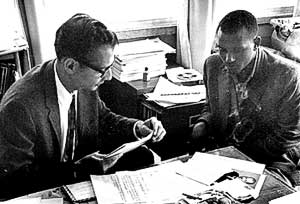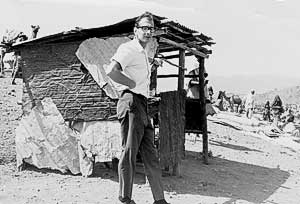A Writer Writes "A Song From Shlomo"
On Sunday afternoon, March 18, 2012, a memorial service was held in Washington, D.C., for Shlomo Bachrach (Ethiopia PC/Staff 1965-67) who died of lung cancer at his home in Los Angeles on December 8, 2011.
Shlomo was a famous figure in Ethiopian/American life who recently published the East Africa Forum online that concentrated on news out of the Horn of Africa. He also had two blog on this site.
In addition to this, he was actively involved in dozens of other activities that promoted understanding between the US and Ethiopia, including working to start the North American-Ethiopian Chamber of Commerce. He was the author of an Ethiopian folktale book published by Oxford University Press, and for many years ran training workshops for PCV TESL teachers in Ethiopia. In recent years his major focus was his work with a local NGO and the Ethiopian government to develop and implement coffee trademark concept on the country’s major export.
At the service held at the Hill Center in Washington the crowded room contained as least two dozen Ethiopians living in America who had been helped or mentored by Shlomo since 1964 when Shlomo first went to Addis Ababa to teach in the Department of Education at Haile Selassie University. Another two dozen in attendance were RPCVs who knew Shlomo in Ethiopia or had become his friend since those years. Some of those who attended the D.C. service had traveled from California, New York and Chicago.
Among the many remembrances and tributes to Shlomo was this one A Song From Shlomo by Dr. Morris Baker (Ethiopia 1966–68) of Abilene, Texas, who knew Shlomo when as a PCV in Ethiopia. I thought that you might like to read these touching remarks from Morris.
•
A Song From Shlomo
by Morris Baker
EVERY DEFINABLE SEGMENT OF OUR LIVES provides memorable moments that made a difference. Two years as a Peace Corps Volunteer in Ethiopia was the richest period of my life in terms of treasured moments that made a difference. The star of one such moment was Shlomo Bachrach. Shlomo Bachrach! Why could I not have been born to such a wonderful name?

Shlomo arrives for a site visit via EAL
It was in December of 1966, the first year of my Peace Corps service, that a small training conference was scheduled for Bahar Dar — my village. Slated to be present were a dozen or so Volunteer teachers from nearby villages. Among the staff members coming from the Addis Ababa were the Country Director, Dr. David Berlew and Shlomo. The sharing of Shlomo’s linguistic expertise was a major reason for the conference.
In preparation for the coming of visitors we who were stationed in Bahar Dar (Mary Sue Hundt, Kay Polga, Robert Hamilton, Gordon Davis, Julius Willis Jr., and I) got busy making a party for the group. Real American hotdogs and hamburger meat were procured through someone’s special link to Kagnew Station in Asmara.
The women used their carefully cultivated connections with the local bakery to fashion something very close to hamburger and hotdog buns. The guys dug a hole and gathered wood to form a barbecue pit over which the meat would be cooked to order.

Meeting with a fellow staff member
Two male Russian teachers from the Polytechnic School would be convinced to sneak away from their compound, long enough to sing and dance to the delight of the gathered group. The Cold War was blazing hot at the time. Peace Corps did not consider it the best use of our time to be fraternizing with Russians. The Russians could have suffered serious consequences were it known by their superiors they often slipped away for clandestine visits in the homes of the Americans.
On the night of the party the Russians were late in coming. It had not been easy for them to leave their compound unnoticed. I sang a couple of songs (i.e. Has Anybody Seen My Gal, Motherless Child, Wayfaring Stranger accompanying myself on Sue’s Ukulele) to warm-up the crowd and give these two huge Russian guys (I should add here that the two were decathletes) time to shake their case of nerves. They played their guitar and sang and they danced, kicking their heels high, to the delight of a very appreciative Peace Corps crew.

Upcountry
When the food was finished, the last ember of the fire pit had gone out, and the chill of the Ethiopian night became too much to bear (even under the best gabi) most of the crowd adjourned to the Ras Hotel. A few moved the party to the house occupied by Sue and Kay. Getting there was a half kilometer walk through tall grass and eucalyptus trees past several tukuls lit only by crude kerosene lamps. The way to the women’ house was pitch black. We had a couple of flashlights to keep us on the familiar path.
At the women’ there was freshly brewed hot buna, maybe some hot chocolate and more conversation and song (i.e. If I had a Hammer, Puff the Magic Dragon, an encore of Motherless Child). The Russians had more songs and dance to offer.
Then came the moment of surprise to everyone when Shlomo requested a turn at playing the Russian’s guitar. With confidence he played and sang in a language not understood by us. First, the Americans fell quiet. The Russians could not conceal their astonishment. He was singing in Russian. This sweet, quiet voice commanded attention although not a word was understood by us. But the Russians understood. The tears in the eyes of the huge Russian men could not be contained by their blinking eyes.
Moved by this demonstration of cross-cultural understanding Kiril, the larger of the two men, reached out gesturing silently to Shlomo that he give back his guitar. Now, Kiril and Valodia gave Russian baritone voice to the song begun by Shlomo. Now, there were no dry eyes.
For those Americans and those Russians, from that moment the Cold War was no more.
•
Dr. Baker was first assigned to a secondary school in Bahar Dar as a science teacher. Reassigned to the Ministry of Health, Morris worked in rural Gojjam as a Leprosy Control Volunteer during his second year of Peace Corps service. Following his tour he filled several administrative roles with Peace Corps, both domestic and overseas. He holds degrees from McMurry University, Harvard School of Education, and The Ohio State University. He lives now in Abilene, TX, where he is engaged as a civic volunteer.
I remember Dr Baker’s remarks and sitting in the back with the Ethiopians in attendance I was moved by the witnessing of an Ethiopian from New York City, who arrived in the US five years ago , and was given Shlomo’s name and phone number. The man said,Shlomo helped him start his business and remained a friend. The Ethiopian was present Sunday to “thank such a kind and humble man.”
Dennis GRubb
Colombia I (1961-1963)